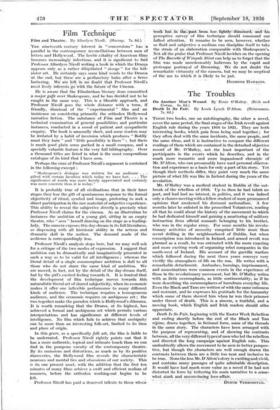. The Troubles_ _
Death Is So Fair. By Louis Lynch D'Alton. ,(Heinemann. 7s. 6d.) THESE two books, one an autobiography, the other a novel,
cover the same period, the final stages of the Irish revolt against English rule during the years 1916 to 1921. They are both interesting books, which gain from being read together ; for they often deal with the same incidents, the same people,, and the same ideas, and it is instructive to compare the different readings of them which are contained in the detaehed objective record of Mr. O'Malley, not the least- important of the participants in the events which he describes, and in the much more romantic and more impassioned chronicle of Mr. D'Alton, who can presumably have used personal observa- tion and experience as a basis for only apart of his story: Yet though their methods differ, they paint very much the-same picture of what life was like in Ireland during the years of the revolution:
Mr. O'Malley was a medical student in Dublin' at the out- break of the rebellion of 1916. Up to then lie had taken no part, and had had no interest, in politics, and it -was indeed only a chance meeting with a fellow student of more pronounced opinions that awakened his dormant nationalism. A few
months later he enlisted in the proscribed Volunteers, reading all that-he could. about the history of the movement to-which he had dedicated himself and gaining a smattering of military
instruction from official manuals belonging to his brother, who was in the regular army. For some months his revolu- tionary activities of necessity eompriied: little more than secret drilling in the neighbourhood • of Dublin, -but when conscription was introduced in Ireland, and armed revolt, was planned as a result, he was entrusted with the more exacting and more exciting work of organising rebel companies in the south-west of Ireland. His account of the guerilla warfare which followed during the next three years conveys very vividly the atmosphere of- life on the run. • He writes with a remarkable detachment. Ambushes,. bumings, imprisonment,
and assassinations were common events in the experience of those in the revolutionary movement, but Mr. O'Malley writes with as little overemphasis, as little sentimentality; as If he
were describing the commonplaces of humdrum everyday life. Even the Black and Tans are written of with the Satne"calmness and restraint, and he expresses his gratitude for the humanity which some of them showed him when he wets their prisoner
under threat of death. "This is a sincere, a truthful, and a moving book, which English and Irish readerS should alike appreciate.
Death Is So Fair, beginning with the Easter Week Rebellion and ending shortly before the end of the Black and Tan regime, draws together, in fictional form, some of the threads
in the same story. The characters have been arranged with the purpose of representing,' and of showing the contrasts between, all the very different types'of men who led the rebellion and directed the long campaign-against English rule. This
undoubtedly allows the movement to be seen in better perspec- tive, but though the (characters - are well enough drawn the
contrasts between then are a little too neat and inclusive to be true. None the less Mr. D'Alton's story is exciting and vivid,
and contains many passages of quite adinirable 'description.
It would have had much more value as a novel if he had not distorted its form by tethering his main narrative to a some-
what stark and unconvincing love-affair.
• - : -DERP.IC- VERSCHOYLE.










































 Previous page
Previous page